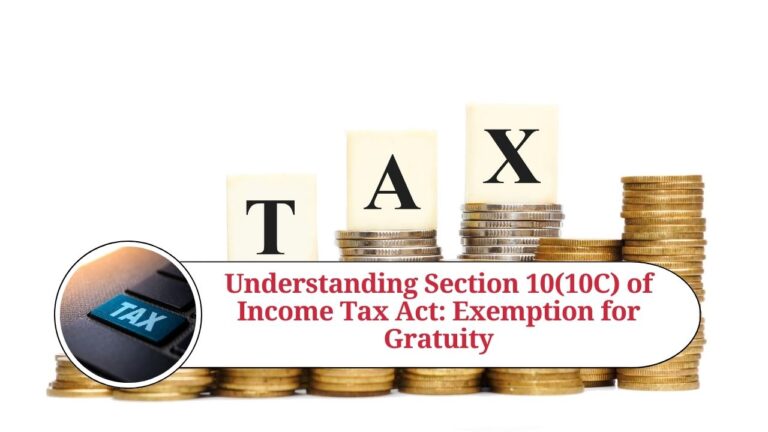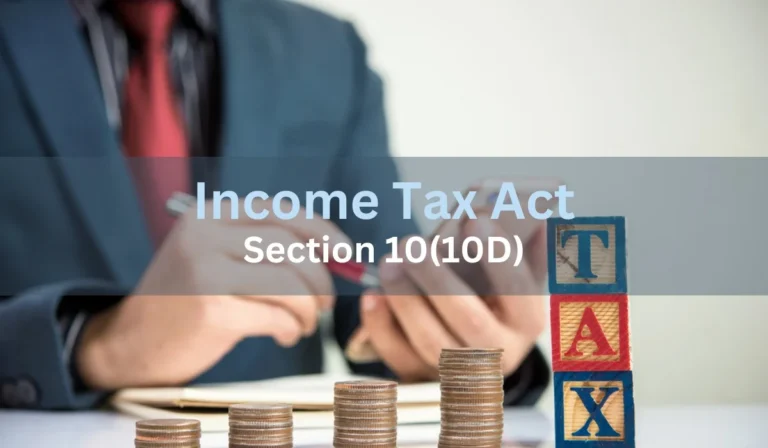Understanding Section 10(23F) of the Income Tax Act: A Comprehensive Guide
When it comes to tax exemptions, Section 10 of the Income Tax Act offers a range of provisions that help investors and entities optimize their tax liabilities. One such provision is Section 10(23F), which specifically caters to venture capital funds and companies. In this blog, we’ll delve deep into the details of Section 10(23F) and related clauses, providing you with a comprehensive understanding of how these exemptions work and who can benefit from them.
What is Section 10(23F)?
Section 10(23F) of the Income Tax Act provides tax exemptions for any income by way of dividends or long-term capital gains earned by a venture capital fund or venture capital company from investments made through equity shares in a venture capital undertaking. This exemption is contingent on the venture capital fund or company meeting certain conditions and obtaining approval from the prescribed authority.
Key Conditions for Exemption
Approval Requirement:
-
- The venture capital fund or company must be approved by the prescribed authority.
-
- This approval is valid for a maximum of three assessment years.
Investment Date:
The exemption does not apply to investments made after March 31, 1999.
Venture Capital Fund Definition:
A venture capital fund is defined as a fund operating under a registered trust deed, primarily for raising money through trustees to invest in equity shares of a venture capital undertaking.
Venture Capital Company Definition:
A venture capital company refers to a company that makes investments in equity shares of venture capital undertakings in line with prescribed guidelines.
Venture Capital Undertaking Definition:
This refers to a domestic company whose shares are not listed on a recognized stock exchange in India and is engaged in specified businesses like electricity generation, telecommunications, infrastructure, or manufacturing of notified articles.

Explanation of Key Terms
1. Venture Capital Fund:
A fund established under a registered trust deed to raise money for investments mainly by acquiring equity shares in venture capital undertakings.
2. Venture Capital Company:
A company that invests in equity shares of venture capital undertakings according to the prescribed guidelines.
3. Venture Capital Undertaking:
A domestic company not listed on any recognized stock exchange in India. It is involved in specific industries such as power generation, telecommunications, infrastructure development, or manufacturing of certain notified products.
Extended Provisions: Sections 10(23FA), 10(23FB), and More
While Section 10(23F) sets the groundwork, other related clauses extend and elaborate on these exemptions:
Section 10(23FA):
-
- Covers dividends and long-term capital gains from investments by venture capital funds or companies.
-
- Applicable for investments made before March 31, 2000.
-
- Similar approval requirements as Section 10(23F).
Section 10(23FB):
-
- Provides exemption for any income of venture capital companies or funds from investments in venture capital undertakings.
-
- From April 1, 2016, does not apply to certain specified investment funds.
Section 10(23FBA) and 10(23FBB):
Exempt income for investment funds and their unit holders, excluding business profits.
Section 10(23FC) and 10(23FCA):
Exempts income for business trusts from special purpose vehicles and real estate assets.
Section 10(23FD) to 10(23FF):
Covers various types of exempt income, including distributed income from business trusts and capital gains from share transfers.
Frequently Asked Questions (FAQ) About Section 10(23F)
Q1: What types of income are exempt under Section 10(23F)?
A1: Section 10(23F) exempts income by way of dividends or long-term capital gains earned by a venture capital fund or venture capital company from investments made through equity shares in a venture capital undertaking.
Q2: What conditions must a venture capital fund or company meet to qualify for the exemption under Section 10(23F)?
A2: The fund or company must be approved by the prescribed authority, and the approval is valid for a maximum of three assessment years. Additionally, the exemption does not apply to investments made after March 31, 1999.
Q3: What is the definition of a venture capital fund under Section 10(23F)?
A3: A venture capital fund is a fund operating under a registered trust deed, primarily established to raise money for investments mainly by acquiring equity shares of venture capital undertakings.
Q4: What is a venture capital undertaking as per Section 10(23F)?
A4: A venture capital undertaking is a domestic company whose shares are not listed on a recognized stock exchange in India and is engaged in businesses such as electricity generation, telecommunications, infrastructure, or manufacturing of notified articles.
Q5: How does Section 10(23FA) differ from Section 10(23F)?
A5: Section 10(23FA) also provides exemptions for dividends and long-term capital gains from investments by venture capital funds or companies, but it applies to investments made before March 31, 2000, and requires approval from the Central Government.
Q6: Are there any specific sectors in which a venture capital undertaking must operate to qualify under Section 10(23F)?
A6: Yes, a venture capital undertaking must operate in specified sectors such as power generation, telecommunications, infrastructure development, or manufacturing of notified products.
Q7: Can a venture capital company or fund lose its exemption status under Section 10(23F)?
A7: Yes, if the conditions specified in the approval are not met or if the investments are made after the specified dates, the venture capital company or fund can lose its exemption status.
Q8: Where can I find more detailed information or seek professional advice regarding Section 10(23F)?
A8: For more detailed information, you can visit Smart Tax Saver or consult with a tax professional to get advice tailored to your specific situation.
Conclusion
Understanding Section 10(23F) and its related provisions is crucial for venture capitalists and investors aiming to optimize their tax liabilities while contributing to the growth of emerging sectors. By meeting the specified conditions and obtaining the necessary approvals, venture capital funds and companies can significantly benefit from these tax exemptions. This not only fosters a conducive environment for startups and infrastructure projects but also aligns with the broader economic goals of fostering innovation and development.
For more detailed advice tailored to your specific situation, it’s always recommended to consult with a tax professional or legal expert.
For more insightful articles on tax laws and investment strategies, visit Smart Tax Saver and stay updated with the latest in tax-saving opportunities.




